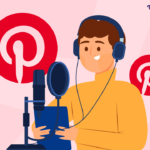What’s the Best Social Media Platform for Your Podcast?
Are you leveraging the right social media platform to maximize your podcast’s reach and engagement? Whether your audience thrives on Instagram’s visual nature or Reddit’s lively discussions, finding the perfect platform is key to promoting your podcast, reaching new fans, and engaging with existing listeners. Here, I’ll explore some of the most effective social media platforms for podcasts, elaborate on the types of podcasts or podcasters that might benefit most from each, and provide real-life examples of successful usage.

Best for: Community building and general audience reach
Facebook is an excellent platform for podcasters looking to build a community and engage with a broad audience. The option for groups and pages allows for direct interaction with listeners, fostering a real sense of community among the host and their listeners. Facebook’s robust advertising tools can also help podcasts target specific demographics, making it easier to reach potential new fans. The platform’s events feature also enables podcasters to promote live shows or virtual/in-person meet-ups.

How to Leverage Facebook for Podcasting Success & Growth
Read article called: How to Leverage Facebook for Podcasting Success & GrowthExample: The Crime Junkie Podcast page shares episode updates, related articles, and hosts discussions that keep their audience engaged and excited for what’s next.
Twitter/X

Best for: Real-time engagement and news-related podcasts
Twitter/X is perfect for real-time engagement and discussions. Podcasters covering news, current events, or any time-sensitive topics can use Twitter to share pertinent updates, engage in conversations, and leverage trending hashtags to increase visibility. The platform’s retweet feature also allows for easy sharing, increasing the chance of word-of-mouth promotion.

Promote Your Podcast on X/Twitter With These 4 Strategies
Read article called: Promote Your Podcast on X/Twitter With These 4 StrategiesExample: The hosts of Stuff You Should Know tweet episode highlights, interesting facts, and engage with their audience through polls and questions, fostering an interactive community.

Best for: Visual content and personal branding
Instagram is ideal for podcasters who can leverage visual content to promote their episodes. Using stories, reels, and posts, podcasters can share behind-the-scenes content, audiograms, and snippets to attract and engage followers. The platform’s visual nature makes it particularly effective for lifestyle, wellness, and personal development podcasts that possess a strong brand identity.

Meet The Podcasters Killing It on Instagram
Read article called: Meet The Podcasters Killing It on InstagramExample: For her podcast ‘Unlocking Us,’ Brené Brown shares quotes, audiograms, and personal insights, connecting deeply with her audience through visual and personal content.
TikTok

Best for: Short, engaging video content and reaching younger audiences
TikTok is a dynamic platform for podcasters who want to create engaging and snappy video content. It’s especially effective for reaching younger audiences, with 70.5% of users being under the age of 35. Creative clips, behind-the-scenes footage, and teaser videos can go viral, significantly increasing podcast visibility. The platform’s algorithm favours creative and engaging content, making it possible for even new podcasters to gain traction quickly if they can commit to a frequent posting schedule.

3 Podcasts on TikTok (And What You Can Learn From Them)
Read article called: 3 Podcasts on TikTok (And What You Can Learn From Them)Example: Alex Cooper uses TikTok to share humorous and relatable clips from her podcast ‘Call Her Daddy,’ leveraging the platform’s trends to engage a young, vibrant audience.

Best for: Professional and niche industry podcasts
LinkedIn is the go-to platform for professional and industry-specific podcasts. It allows podcasters to connect with professionals, share insights, and establish authority in their field. Business, entrepreneurship, and career-focused podcasts thrive here. LinkedIn’s article and post features enable detailed content sharing, which can drive deeper engagement.

How to Leverage LinkedIn to Boost Your Podcast Reach and Visibility
Read article called: How to Leverage LinkedIn to Boost Your Podcast Reach and VisibilityExample: The Harvard Business Review uses LinkedIn to share episode updates and articles related to their podcast HBR IdeaCast, engaging a professional audience interested in business and management.

Best for: Visual and lifestyle content
Pinterest is an ideal platform for podcasters who wish to create visually appealing pins to drive traffic to their episodes. It’s particularly useful for lifestyle, DIY, and niche interest podcasts. Pins can link directly to podcast episodes, show notes, or blog posts, making it an effective tool for driving website traffic and episode listens.

5 Powerful Pinterest Podcast Promotion Strategies
Read article called: 5 Powerful Pinterest Podcast Promotion StrategiesExample: Diabetes Digital Podcast by Food Heaven shares recipes, health tips, and episode highlights on Pinterest, driving traffic back to their website and episodes.

Best for: Niche communities and detailed discussions
Reddit is ideal for podcasters who want to engage with niche communities and foster detailed, in-depth discussions. Subreddits can be used to share specific episodes, ask for feedback, and participate in relevant discussions, helping to build a dedicated listener base. The platform’s upvote system ensures that quality content rises to the top, enhancing visibility.

Reddit for Podcasters: Authenticity, Participation, & Depth
Read article called: Reddit for Podcasters: Authenticity, Participation, & DepthExample: Aaron Mahnke’s podcast ‘Lore’, which discusses folklore and supernatural events, uses Reddit to discuss episode topics and gather listener stories and feedback.
Discord

Best for: Community interaction and real-time communication
Discord is perfect for podcasters looking to create a tight-knit community with real-time communication. It’s particularly effective for gaming, tech, and hobbyist podcasts. Podcasters can create servers to interact directly with listeners, host live discussions, and build a loyal community. The platform’s voice channels and chat rooms allow for various types of engagement.

Discord for Podcasters: Engagement Without Exasperation
Read article called: Discord for Podcasters: Engagement Without ExasperationExample: Critical Role, a popular Dungeons & Dragons podcast, has a thriving Discord server where fans discuss episodes, engage in real-time chat, and participate in community events, creating a highly engaged listener base.

The Social Media Platforms That Actually Work For Podcasters (And Why)
Read article called: The Social Media Platforms That Actually Work For Podcasters (And Why)Best Social Media Platform for YOUR Podcast?
Choosing the right social media platform for your podcast and your audience can significantly impact the overall reach of and level of engagement with your show. As illustrated here, each platform offers its own methods of connecting with your audience. By understanding the strengths or limitations of each platform, as well as the interests of their listeners, podcasters can tailor their social strategies for maximum reach and impact. Leveraging these platforms effectively can enhance your podcast’s visibility. They can also deepen your connection with your audience, fostering a loyal community that keeps coming back for more.
Next Steps
Our pillar podcast promotion guide has tips on every way to promote a podcast, both on and off of social media.
If you’re looking to create some additional content for social media, then be sure to check out these AI video repurposing tools, too.
Finally, if you’re not sold on using any social media platforms for your podcast, don’t worry—there’s nothing to say that you must. Our guide on how to podcast without social media offers tactics and strategies for creating a discoverable show without any of the platforms mentioned here. Ultimately, it’s always about what works best for you, your content, and your audience!

